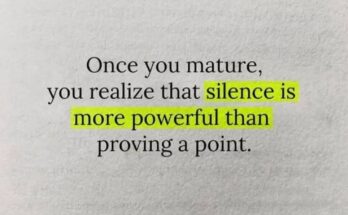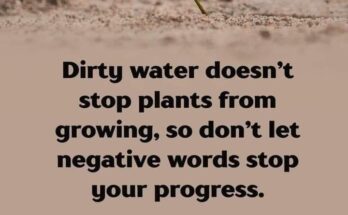There is a profound truth in the saying, “You could give some people a drop of water, and they’d still appreciate you.” This statement speaks volumes about gratitude, humility, and the diverse ways in which people perceive kindness. In a world that often seems driven by materialism and the pursuit of more, there remain those who find immense value in even the smallest gestures. This essay explores the concept of gratitude through various lenses: personal experiences, historical examples, and philosophical reflections on why appreciation matters in human relationships and society.
The Nature of Gratitude
Gratitude is the ability to recognize and appreciate the kindness, generosity, or assistance one receives. It is not merely about receiving something tangible; it extends to the acknowledgment of effort, intention, and goodwill. Some people are naturally inclined to be grateful, regardless of how much or how little they have. Others may struggle with appreciation, always seeking more without acknowledging the blessings already present in their lives. The contrast between these perspectives reveals much about human nature and the way we relate to one another.
The Smallest Acts Can Mean the Most
Many individuals have experienced moments where a seemingly insignificant act of kindness made a profound impact. Consider a scenario where someone, struggling in life, receives a small gesture—perhaps a kind word, a meal, or a helping hand. To an outsider, it might appear trivial, but to the recipient, it could mean the difference between hope and despair.
One powerful example is found in humanitarian efforts worldwide. In drought-stricken regions, a single bottle of water can mean survival. While people in developed nations may take clean water for granted, for those in dire situations, every drop is precious. This principle extends beyond physical sustenance; sometimes, emotional support or simple acts of kindness can be just as crucial.
The Role of Perspective in Gratitude
Why do some people deeply appreciate even the smallest gifts while others remain dissatisfied no matter how much they receive? Perspective plays a crucial role in gratitude. A person who has known hardship is more likely to appreciate even the smallest kindnesses, whereas someone who has never faced deprivation might not recognize the value of what they have.
Studies in psychology suggest that gratitude is not necessarily tied to wealth or abundance but rather to an individual’s mindset. People who actively practice gratitude—whether through journaling, meditation, or reflection—tend to be happier and more content. They learn to see the value in everything, from a smile to a moment of peace, recognizing that life itself is a gift.
Historical Examples of Gratitude
History is replete with stories of individuals who appreciated even the smallest acts of kindness. One well-known example is the tale of Helen Keller, who, despite being deaf and blind, deeply appreciated the efforts of her teacher, Anne Sullivan. A few simple hand signals into her palm unlocked the world for her, and she remained eternally grateful for that gift of communication.
Another example can be found in the stories of prisoners of war or refugees who, after enduring immense suffering, speak of the smallest gestures of kindness—perhaps a piece of bread shared by a fellow prisoner or a kind word from a stranger—that restored their faith in humanity. These moments illustrate how, in times of great suffering, even a drop of water can symbolize hope and survival.
The Impact of Gratitude on Relationships and Society
Gratitude is not just a personal virtue; it has a ripple effect on relationships and society as a whole. When people feel appreciated, they are more likely to be generous in return, creating a cycle of goodwill. In contrast, a lack of gratitude can lead to resentment, entitlement, and strained relationships.
In families, for instance, expressions of gratitude strengthen bonds. A parent who sacrifices for their child appreciates when their efforts are acknowledged. A friend who lends a helping hand values a simple “thank you.” In the workplace, employees who feel appreciated by their employers are more motivated and engaged. Societies that cultivate a culture of gratitude tend to be more cohesive and supportive, whereas those that foster entitlement often breed dissatisfaction.
Practicing Gratitude in Everyday Life
Given the profound impact of gratitude, how can one cultivate it? The first step is awareness—recognizing the blessings, however small, in daily life. Keeping a gratitude journal, where one lists things they are thankful for each day, is a common and effective practice. Another method is expressing gratitude more frequently, whether through words, actions, or even written notes.
It is also important to appreciate the kindness of others without taking it for granted. Whether it is a service worker doing their job, a friend offering a listening ear, or a stranger holding the door open, acknowledging these gestures fosters a mindset of gratitude.
Conclusion
The phrase “You could give some people a drop of water, and they’d still appreciate you” reminds us that gratitude is not about the size of the gift but the heart that receives it. Those who practice gratitude find joy in even the smallest blessings, while those who fail to appreciate often remain unfulfilled despite abundance. By fostering an attitude of gratitude, both individually and collectively, we can create a world where kindness is valued, relationships are strengthened, and the simplest gestures hold profound meaning. In the end, appreciation is not about what we receive but how we choose to see the world around us.


